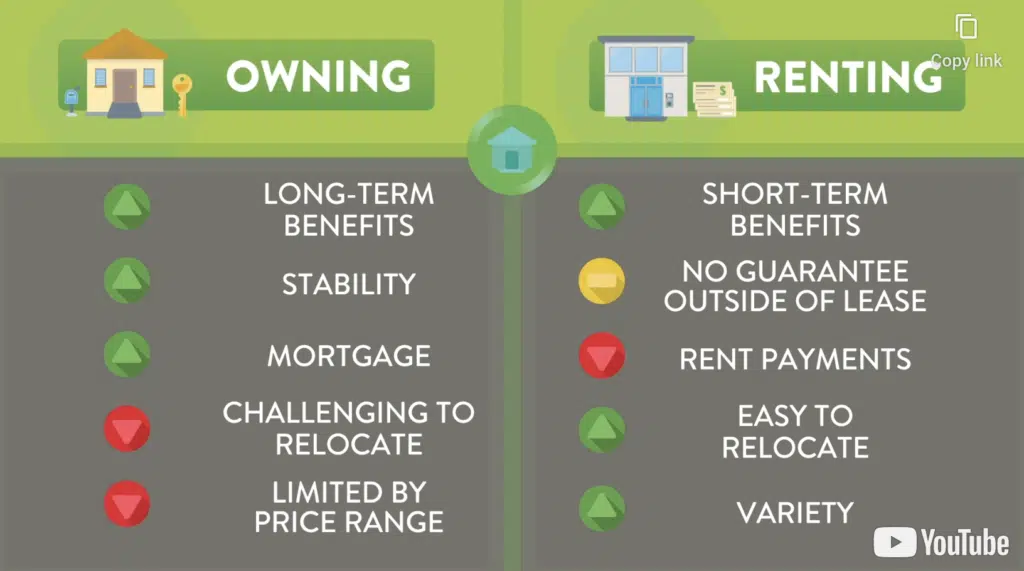
The Benefits of Owning vs. Renting a Home
When it comes to finding a place to live, the age-old question always resurfaces: Is it better to buy a house or rent one? The decision between renting and owning is a significant one and can affect every aspect of your life, from financial stability to personal freedom. With the reality that everyone’s situation is unique, this article aims to break down the benefits of both owning and renting a home, so you can make an informed decision that’s right for you.
Understanding the Value of Homeownership
Building Equity: Your Investment in the Future
Owning a home allows you to build equity over time. Think of equity like a savings account that grows as you pay off your mortgage and as your property value increases. The more of your house that you “own” outright, the more wealth you accumulate. In contrast to rent, which is an expense, each mortgage payment is an investment in your financial future.
Stability and Predictability
Owning a home provides a sense of stability and predictability. Your mortgage payments are fixed if you opt for a traditional, fixed-rate loan, unlike rent, which can fluctuate based on the housing market. This consistency is key in budgeting and financial planning, as it secures one of your largest living expenses.
Tax Benefits
Come tax season, homeowners can often take advantage of significant tax benefits. Mortgage interest, property tax deductions, and certain home improvements can lead to sizeable savings, trimming down your tax bill in ways that renting cannot.
Customizing Your Space
Homeownership means you have freedom over your space. You can paint walls, switch out fixtures, and make renovations that reflect your style – all without needing a landlord’s approval. These changes can also boost your home’s value, turning aesthetic choices into sound investments.
Long-Term Gains
Real estate tends to increase in value over the long term. While markets fluctuate, owning a home is generally considered a safe investment as it often leads to capital gains when selling, provided you’ve owned the home for a sufficient period.
The Advantage of Renting: Flexibility and Low Maintenance
Flexibility to Move
Renting offers unmatched freedom to move. With shorter commitment periods, you can change locations relatively easily, which is great for people whose careers or lifestyles require mobility. Homeownership, while providing stability, does lock you into a location until you sell your house, which can be a lengthy process.
Less Responsibility and Maintenance
When it comes to upkeeping your living space, renters have it easier. Landlords are usually responsible for repairs and maintenance, which means less hassle for you. When you own, however, every repair, from a leaky faucet to a broken heater, is yours to handle – both in terms of effort and expense.
Lower Insurance and No Property Taxes
As a renter, you only need renters’ insurance, which is typically much cheaper than homeowners’ insurance. Additionally, renters don’t pay property taxes – a significant financial burden homeowners must shoulder.
But What About the Cost?
Initial Costs and Monthly Expenses
One of the significant barriers to homeownership is the initial cost, including the down payment, closing costs, and other upfront fees. These can be steep and often require extensive savings. Renting, on the other hand, usually requires just a security deposit and first month’s rent, making it more accessible for many people.
Ongoing Expenses
Comparing the monthly costs of owning versus renting can be complex. While homeowners face mortgage payments, property taxes, insurance, and maintenance costs, renters contend with monthly rent and renters’ insurance. Over time, as a homeowner continues to build equity and potentially benefits from rising property values, the balance may tip in favor of owning.
Personal Considerations: What Suits Your Lifestyle?
Your Career and Life Stability
Long-term job stability and knowing that you’re not expecting significant life changes (like moving cities or an expanding family) can make homeownership a smarter decision. If, however, you’re likely to move jobs or are uncertain about your future, renting provides the flexibility you might need.
Your Appetite for Home Improvement
Some people relish the idea of working on their homes – be it DIY projects or substantial renovations. For such individuals, owning a home provides a satisfying venue for their skills and creativity. Others might find this daunting and prefer the ease of contacting the landlord when something needs fixing.
Your Financial Goals
Your approach to investing and saving money may also influence your decision. If you’re looking for a long-term investment and have the financial stability to afford a home, owning can be a strategic move. If you prefer to invest your money in other ways or value having liquidity, then renting may better suit your financial plans.
Conclusion
Ultimately, the choice to own or rent is deeply personal and depends on individual circumstances and goals. Owning can be a rewarding path toward financial security and personal fulfillment but comes with significant responsibilities and upfront costs. On the flip side, renting offers unparalleled flexibility and decreased responsibilities, allowing for a freer, arguably less complicated lifestyle. Carefully weigh both the tangible and intangible benefits as you consider what aligns with your life today and the goals you have for tomorrow. Whatever you choose, ensure it’s a place that feels like home to you.